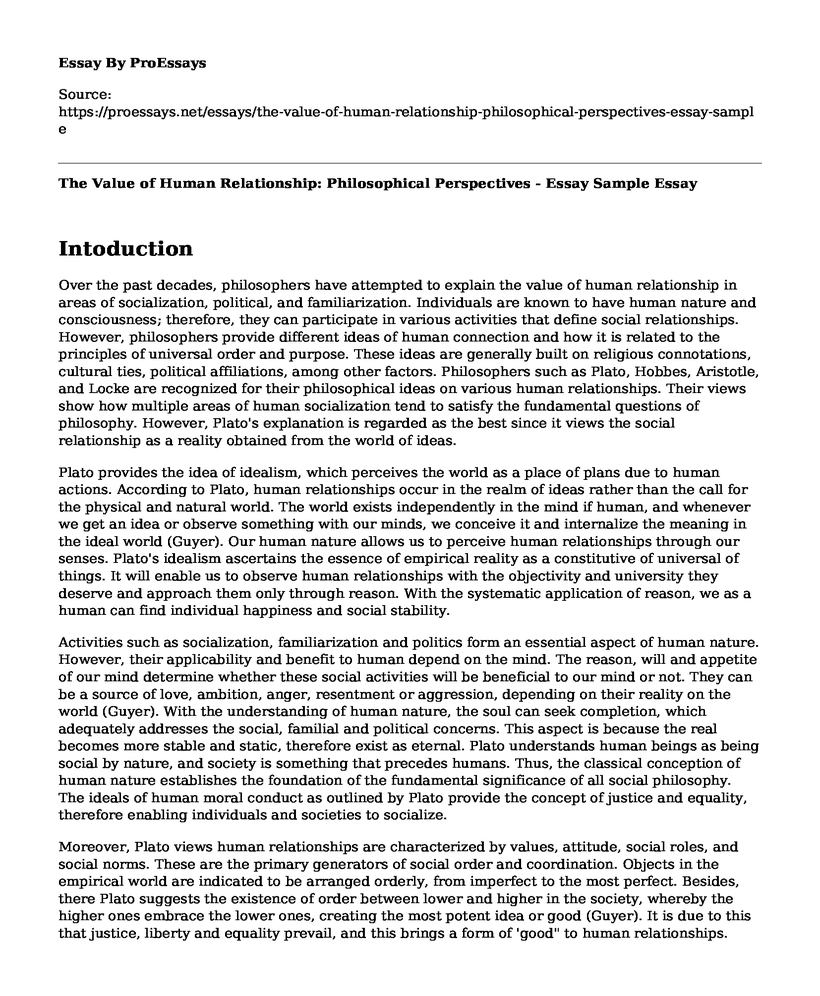Intoduction
Over the past decades, philosophers have attempted to explain the value of human relationship in areas of socialization, political, and familiarization. Individuals are known to have human nature and consciousness; therefore, they can participate in various activities that define social relationships. However, philosophers provide different ideas of human connection and how it is related to the principles of universal order and purpose. These ideas are generally built on religious connotations, cultural ties, political affiliations, among other factors. Philosophers such as Plato, Hobbes, Aristotle, and Locke are recognized for their philosophical ideas on various human relationships. Their views show how multiple areas of human socialization tend to satisfy the fundamental questions of philosophy. However, Plato's explanation is regarded as the best since it views the social relationship as a reality obtained from the world of ideas.
Plato provides the idea of idealism, which perceives the world as a place of plans due to human actions. According to Plato, human relationships occur in the realm of ideas rather than the call for the physical and natural world. The world exists independently in the mind if human, and whenever we get an idea or observe something with our minds, we conceive it and internalize the meaning in the ideal world (Guyer). Our human nature allows us to perceive human relationships through our senses. Plato's idealism ascertains the essence of empirical reality as a constitutive of universal of things. It will enable us to observe human relationships with the objectivity and university they deserve and approach them only through reason. With the systematic application of reason, we as a human can find individual happiness and social stability.
Activities such as socialization, familiarization and politics form an essential aspect of human nature. However, their applicability and benefit to human depend on the mind. The reason, will and appetite of our mind determine whether these social activities will be beneficial to our mind or not. They can be a source of love, ambition, anger, resentment or aggression, depending on their reality on the world (Guyer). With the understanding of human nature, the soul can seek completion, which adequately addresses the social, familial and political concerns. This aspect is because the real becomes more stable and static, therefore exist as eternal. Plato understands human beings as being social by nature, and society is something that precedes humans. Thus, the classical conception of human nature establishes the foundation of the fundamental significance of all social philosophy. The ideals of human moral conduct as outlined by Plato provide the concept of justice and equality, therefore enabling individuals and societies to socialize.
Moreover, Plato views human relationships are characterized by values, attitude, social roles, and social norms. These are the primary generators of social order and coordination. Objects in the empirical world are indicated to be arranged orderly, from imperfect to the most perfect. Besides, there Plato suggests the existence of order between lower and higher in the society, whereby the higher ones embrace the lower ones, creating the most potent idea or good (Guyer). It is due to this that justice, liberty and equality prevail, and this brings a form of 'good" to human relationships. There is no reality than what is received from these ideas. Also, the existence of an ideal world causes a hierarchical arrangement similar to those in the sensible world.
On political issues that define the human relationship, Plato provides theoretical examinations on the fundamental political question of justice. He explores various political issues that offer the most extensive scope of political science and different forms of governments, and also dialogues that investigate particular virtues of characters among them moderation and courage (Korab-Karpowicz). Besides, he provides a critical examination of beliefs, and their authenticity to answer the question of the best political order. In every human relationship, the existence of justice appears as the most significant ethical and political concept. Plato views the basics of human relationships to depend on individual virtues, individual rights and order of the society.
Plato believes that the best political order considers social diversity and conflicting interests of the society. Generally, the political community is made up of various social classes, which represent different claims, interests and values (Korab-Karpowicz). There is a likelihood to have controversies and conflict arising due to diversity. However, Plato views an ideal human relationship as one that eliminates the notion of status quo and safeguards the value of the majority. He advocates for peace in social diversity and not the victory of one class in society.
Conclusion
In conclusion, Plato explanation of various aspects that support human relationship is concrete. For the social and familial issues, the concept of human nature forms the basis of ideal human conduct and morals. Also, Plato provides the idea of justice and equality, therefore enabling individuals and societies to socialize. Human lives in a world of diversity and this can cause conflict within the community. As a result, Plato offers philosophical insights that bring out the concept of balancing conflicting interests and union of different social class.
Works Cited
Guyer, Paul. "Idealism." Stanford, 30 August 2015, plato.stanford.edu/entries/idealism/. Accessed 17 December 2019.
Korab-Karpowicz. "Plato: Political Philosophy." IEP, www.iep.utm.edu/platopol/. Accessed 17 December 2019.
Cite this page
The Value of Human Relationship: Philosophical Perspectives - Essay Sample. (2023, Mar 21). Retrieved from https://proessays.net/essays/the-value-of-human-relationship-philosophical-perspectives-essay-sample
If you are the original author of this essay and no longer wish to have it published on the ProEssays website, please click below to request its removal:
- Essay Example on Social Workers' Ethics
- Ethical Choices in the Design and Administration of Executive Compensation Programs
- Research Paper on Engaging Parents With Children
- The Barbie Doll and Female Beauty Standards - Essay Sample
- Achieving the American Dream: Equality for All - Essay Sample
- Humans: Social, Political, and Submissive to the Unknown - Essay Sample
- Essay Example on Classification of 'Ordinary Workers': A Debate on Methodology







